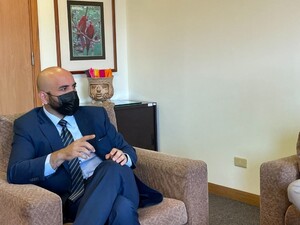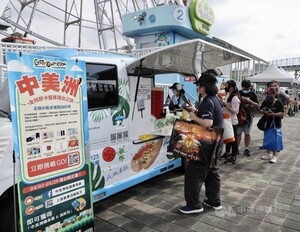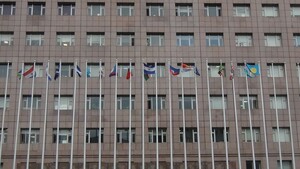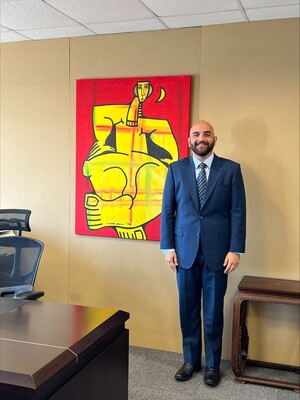New Honduran Ambassador and NCCU Alumnus Aims to Accelerate Awareness and Build Multi-lateral Ties




Date :
2022-07-27
Department :
Office of International Cooperation (OIC)
【Article by the Office of International Cooperation】
Ambassador Harold Burgos, the newly appointed representative of Honduras in the ROC and NCCU alumnus, is focused on promoting awareness of Honduras and Honduran products amongst Taiwanese people. Arriving late June this year, the Ambassador says that his appointment is about showing Taiwan that Honduras is committed to maintaining current relations, and improving trade links.
Ambassador Burgos has received his credentials from the Honduran government and has met with the Taiwanese Foreign Minister, and will officially begin carrying out his duties until he meets with President Tsai, which is planned for the 16th of August.
In the meantime, he has been hard at work getting acquainted with the diplomatic community in Taiwan, which he says is very close. “I’ve been doing the rounds and everyone is so open and kind, they have so much experience as well” he said. “For example, the Ambassador of Tuvalu” (with which the Honduran embassy shares a floor) “was once the Prime Minister, and so you have all the people who have held high positions back home.”
Though the Ambassador has only been in Taiwan a short time, his experience with Taiwan and in studying Chinese began over 10 years ago, when Burgos was a MOFA Taiwan Scholarship recipient studying Economics at NCCU. He said that his first and only choice for study in Taiwan was NCCU, and he was so determined to study here he didn’t apply to any other universities.
“I was interested in NCCU because of the program, because of the school, and everyone spoke so highly of it” the Ambassador said. He said during that time, he really wanted to get a solid theoretical framework for understanding the world, and that economics provided that. “Politics is a lot of emotion in the end, but if you have the ability to view events through an economic framework, you have the ability to get a clear idea of what is really happening.”
But why NCCU specifically? “I was so determined that I was going to go to NCCU that I only applied to that program” the Ambassador said. He also said that studying in NCCU opened the door to many different countries and culture, and that’s one of the aspects he remembers best of his time there. He also mentioned how NCCU’s programs are very accommodating to students with limited Chinese ability.
“It was very international” he said. “I had some classes in Chinese that were hard, but I knew there were classes I could take from the business department, from the diplomacy department, that I could take in English. The international part of NCCU was very important for me, I think that is why I was so set on NCCU.”
As for his plans for his time in office, the Ambassador said he was focused on two main areas; building awareness of Honduras for commerce, and building educational links between Taiwan and Honduras.
“The pandemic has affected our position in commerce” he said, noting that coffee and seafood exports were down compared to normal. “We have some of the best coffee, tobacco, and cocoa in the world” he said, “but we aren’t getting the awareness we need.”
“Everywhere that we can get business moving is great. Branding and awareness of the country is something that we are really working on” he said. “Culture is important yes, but we are so far away from each other, so what really gets the countries going is the commercial side.”
Due to the distance between Taiwan and Honduras (flying may take up to 2-3 days with transfers), the Ambassador said that it’s difficult to get Taiwanese people to come to Honduras for tourism.
“That’s one of the big issues,” he said. “How do you promote tourism, how do you get someone to travel for 2 or three days, fight jetlag when you get there, and then come back?” he also said that the Taiwanese culture prioritises work, and that makes it difficult for most Taiwanese people to even consider a holiday that is so far away, and requires so much time.
The Ambassador says that perhaps a multi-country holiday is a solution to this problem. “Something we have been discussing is promoting [Central America] as an area destination, not just focusing on Honduras, but possibly visiting Guatemala, Belize and Honduras all in one trip.”
He also said that the promotion of flights with fewer stopovers and shorter travel times would help to solve this problem, as at present a trip from Taiwan to Honduras could involve multiple transfers in both Asian and American airports.
The Ambassador also said that he’s really interested in the role of education in building Taiwan-Honduras ties, and said that in addition to the large number of scholarships coming here from Honduras, there is also great potential for attracting self-funded students too.
“There are very competitive prices [in Taiwan], and you get amazing high-quality education. There are some universities in Honduras that could be even more expensive than studying here.” In addition to the course content, the Ambassador noted the massive benefits that come through cultural exchanges.
“When people leave the country, they get to know open their mind in such a way that you would not get if you stay back home’ he said.
“Even just for six months, going abroad can change your mind in so many ways, you meet so many people, and you discover that we are so connected, this world is very small, getting us outside of that bubble. “
In addition to good value and high-quality education, Ambassador Burgos also mentioned the safety of Taiwan, and its location in Asia, giving easy access to many other destinations for travel.
One of the main projects the Honduran Embassy has embarked on recently has been a touring food truck, offering Central American Foods to Taiwanese people at locations throughout the country.
For nine weekends earlier this year, food trucks travelled to 15 cities and counties throughout Taiwan, each offering Central American dishes. An example of Honduran food offered was a baleada, a Honduran street food made from flour tortillas with fillings like refried red beans and cheese.
In terms of Taiwanese people’s awareness of Honduras, the Ambassador says it’s a mixed bag. “It depends on who you’re talking with” he said.
“If you’re in a taxi, the taxi driver could be so aware of Honduras, asking ‘oh are you switching [diplomatic recognition to China]’, and then there are also a lot of people who have no idea. It depends on what generation they are, how involved and interested they are in the topic.”
The topic of switching diplomatic recognition from the ROC to the PRC has been receiving a lot of attention in Honduran domestic politics, with the current Honduran President Xiomara Castro stating during her election campaign that she would switch diplomatic recognition to the PRC if elected.
She has since rescinded on this promise, and Ambassador Burgos says that his appointment is directly related to this issue and is of strategic importance, especially following Nicaragua’s switch to recognition of the PRC late last year. Panama, El Salvador and the Dominican Republic have also cut diplomatic ties with Taiwan in the past four years. But 14 countries, including Honduras, still maintain formal diplomatic relations with Taiwan.
For now, the Ambassador said there has been no contact with China. Taiwan has also promoted several incentives for maintaining the status quo, with the Ministry of Economic Affairs removing tariffs on 25 import items from Honduras, including meat and dairy. “My position here has to do with that, to reassure [Taiwan] that we are continuing the relationship.”
Ambassador Harold Burgos, the newly appointed representative of Honduras in the ROC and NCCU alumnus, is focused on promoting awareness of Honduras and Honduran products amongst Taiwanese people. Arriving late June this year, the Ambassador says that his appointment is about showing Taiwan that Honduras is committed to maintaining current relations, and improving trade links.
Ambassador Burgos has received his credentials from the Honduran government and has met with the Taiwanese Foreign Minister, and will officially begin carrying out his duties until he meets with President Tsai, which is planned for the 16th of August.
In the meantime, he has been hard at work getting acquainted with the diplomatic community in Taiwan, which he says is very close. “I’ve been doing the rounds and everyone is so open and kind, they have so much experience as well” he said. “For example, the Ambassador of Tuvalu” (with which the Honduran embassy shares a floor) “was once the Prime Minister, and so you have all the people who have held high positions back home.”
Though the Ambassador has only been in Taiwan a short time, his experience with Taiwan and in studying Chinese began over 10 years ago, when Burgos was a MOFA Taiwan Scholarship recipient studying Economics at NCCU. He said that his first and only choice for study in Taiwan was NCCU, and he was so determined to study here he didn’t apply to any other universities.
“I was interested in NCCU because of the program, because of the school, and everyone spoke so highly of it” the Ambassador said. He said during that time, he really wanted to get a solid theoretical framework for understanding the world, and that economics provided that. “Politics is a lot of emotion in the end, but if you have the ability to view events through an economic framework, you have the ability to get a clear idea of what is really happening.”
But why NCCU specifically? “I was so determined that I was going to go to NCCU that I only applied to that program” the Ambassador said. He also said that studying in NCCU opened the door to many different countries and culture, and that’s one of the aspects he remembers best of his time there. He also mentioned how NCCU’s programs are very accommodating to students with limited Chinese ability.
“It was very international” he said. “I had some classes in Chinese that were hard, but I knew there were classes I could take from the business department, from the diplomacy department, that I could take in English. The international part of NCCU was very important for me, I think that is why I was so set on NCCU.”
As for his plans for his time in office, the Ambassador said he was focused on two main areas; building awareness of Honduras for commerce, and building educational links between Taiwan and Honduras.
“The pandemic has affected our position in commerce” he said, noting that coffee and seafood exports were down compared to normal. “We have some of the best coffee, tobacco, and cocoa in the world” he said, “but we aren’t getting the awareness we need.”
“Everywhere that we can get business moving is great. Branding and awareness of the country is something that we are really working on” he said. “Culture is important yes, but we are so far away from each other, so what really gets the countries going is the commercial side.”
Due to the distance between Taiwan and Honduras (flying may take up to 2-3 days with transfers), the Ambassador said that it’s difficult to get Taiwanese people to come to Honduras for tourism.
“That’s one of the big issues,” he said. “How do you promote tourism, how do you get someone to travel for 2 or three days, fight jetlag when you get there, and then come back?” he also said that the Taiwanese culture prioritises work, and that makes it difficult for most Taiwanese people to even consider a holiday that is so far away, and requires so much time.
The Ambassador says that perhaps a multi-country holiday is a solution to this problem. “Something we have been discussing is promoting [Central America] as an area destination, not just focusing on Honduras, but possibly visiting Guatemala, Belize and Honduras all in one trip.”
He also said that the promotion of flights with fewer stopovers and shorter travel times would help to solve this problem, as at present a trip from Taiwan to Honduras could involve multiple transfers in both Asian and American airports.
The Ambassador also said that he’s really interested in the role of education in building Taiwan-Honduras ties, and said that in addition to the large number of scholarships coming here from Honduras, there is also great potential for attracting self-funded students too.
“There are very competitive prices [in Taiwan], and you get amazing high-quality education. There are some universities in Honduras that could be even more expensive than studying here.” In addition to the course content, the Ambassador noted the massive benefits that come through cultural exchanges.
“When people leave the country, they get to know open their mind in such a way that you would not get if you stay back home’ he said.
“Even just for six months, going abroad can change your mind in so many ways, you meet so many people, and you discover that we are so connected, this world is very small, getting us outside of that bubble. “
In addition to good value and high-quality education, Ambassador Burgos also mentioned the safety of Taiwan, and its location in Asia, giving easy access to many other destinations for travel.
One of the main projects the Honduran Embassy has embarked on recently has been a touring food truck, offering Central American Foods to Taiwanese people at locations throughout the country.
For nine weekends earlier this year, food trucks travelled to 15 cities and counties throughout Taiwan, each offering Central American dishes. An example of Honduran food offered was a baleada, a Honduran street food made from flour tortillas with fillings like refried red beans and cheese.
In terms of Taiwanese people’s awareness of Honduras, the Ambassador says it’s a mixed bag. “It depends on who you’re talking with” he said.
“If you’re in a taxi, the taxi driver could be so aware of Honduras, asking ‘oh are you switching [diplomatic recognition to China]’, and then there are also a lot of people who have no idea. It depends on what generation they are, how involved and interested they are in the topic.”
The topic of switching diplomatic recognition from the ROC to the PRC has been receiving a lot of attention in Honduran domestic politics, with the current Honduran President Xiomara Castro stating during her election campaign that she would switch diplomatic recognition to the PRC if elected.
She has since rescinded on this promise, and Ambassador Burgos says that his appointment is directly related to this issue and is of strategic importance, especially following Nicaragua’s switch to recognition of the PRC late last year. Panama, El Salvador and the Dominican Republic have also cut diplomatic ties with Taiwan in the past four years. But 14 countries, including Honduras, still maintain formal diplomatic relations with Taiwan.
For now, the Ambassador said there has been no contact with China. Taiwan has also promoted several incentives for maintaining the status quo, with the Ministry of Economic Affairs removing tariffs on 25 import items from Honduras, including meat and dairy. “My position here has to do with that, to reassure [Taiwan] that we are continuing the relationship.”
